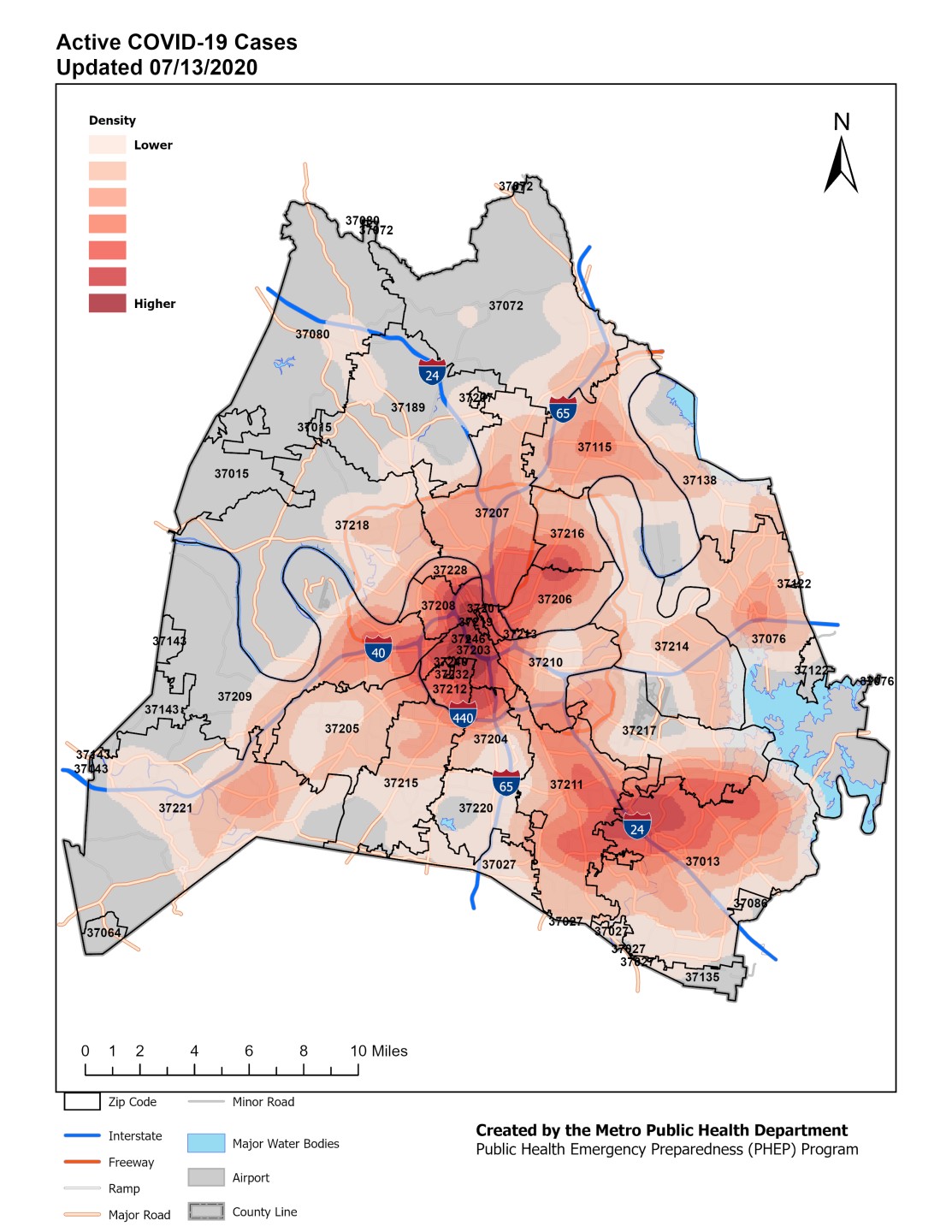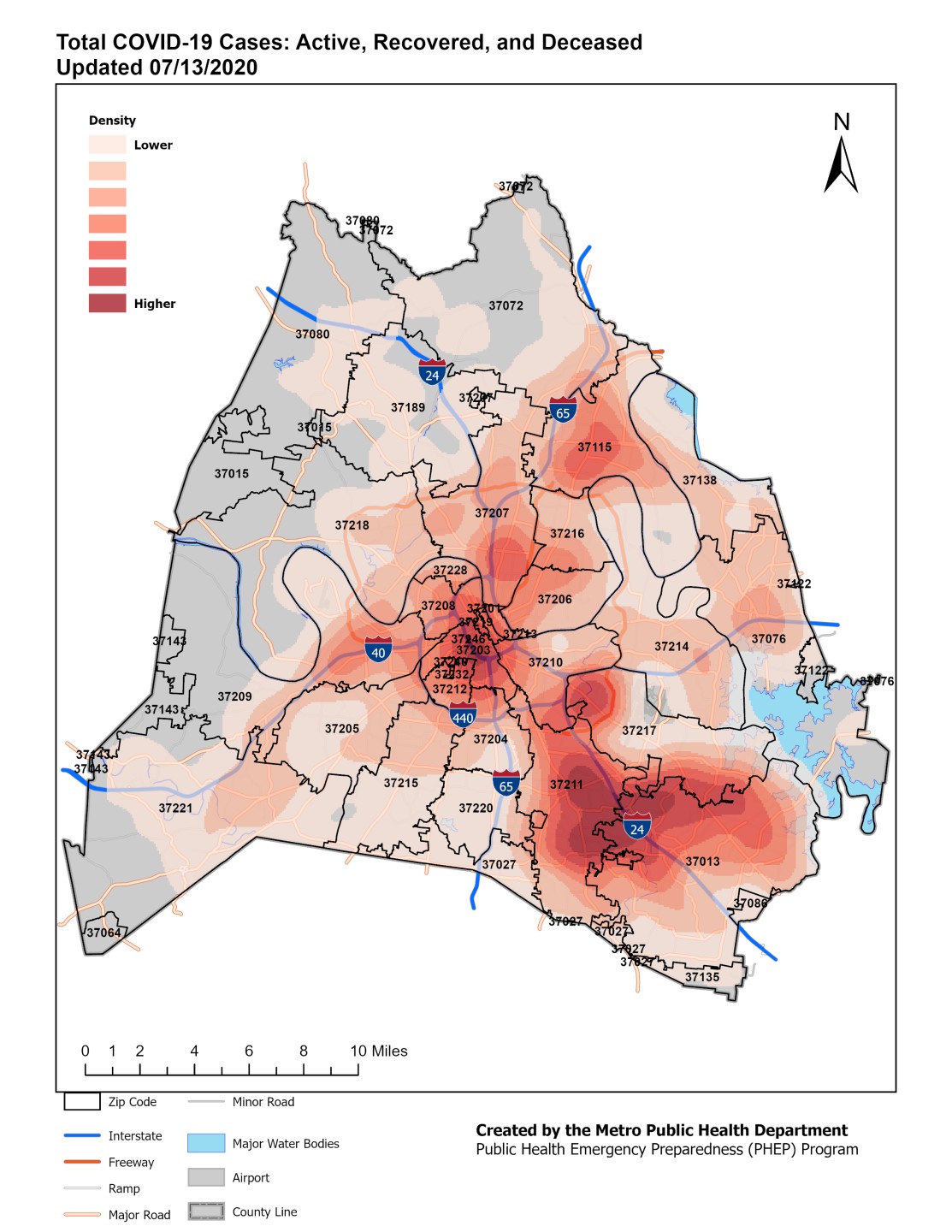July 14 COVID-19 update: 66,788 total cases, 767 deaths in Tennessee – NewsChannel5.com
July 14 COVID-19 update: 66,788 total cases, 767 deaths in Tennessee NewsChannel5.com
NASHVILLE, Tenn. (WTVF) — The Tennessee Department of Health reported 1,514 additional COVID-19 cases on Tuesday afternoon.
The state announced its highest single-day increase of cases since the outbreak began on Monday, with 3,314 new cases reported.
Gov. Bill Lee will hold a press conference where he is expected to discuss the spread of COVID-19 in Tennessee.
Watch the press conference below at 3 p.m.
Tennessee has had a total of 66,788 cases reported overall, including both confirmed and probable, and 38,272 people are now considered recovered from the virus.
Probable cases refer to those that do not test positive in a diagnostic test but might have tested positive in a different form of test like an antibody or serologic test. Probable cases also could refer to cases that were never tested but exhibited the factors consistent with a COVID-19 infection, like symptoms and close contacts of confirmed cases.
As of Tuesday, 767 Tennesseans have died from COVID-19, an increase of 18 people reported in the last 24 hours. There have been a total of 3,378 people hospitalized for the virus as of July 14. This is an increase of 94 hospitalizations in the last 24 hours, which is the highest single-day increase of hospitalizations for the state so far.
More than 1 million COVID-19 tests have been administered statewide.
Metro health officials reported 771 new cases Tuesday, marking the highest single-day increase since the pandemic began. The previous record high was set just last week.
Including both confirmed and probable cases, Metro officials announced a total of 15,473 cases. Of those total cases, 15,456 are confirmed and 17 are probable.
As of Tuesday, 140 people in Davidson County have died after a confirmed case of COVID-19. Including both confirmed and probable cases, 143 deaths have been attributed to the virus.
Mayor John Cooper said with the continued surge in cases, the city will have to remain in Phase Two.
Dr. Alex Jahangir said Metro has added 2,031 new cases since their update last Thursday. He said right now, Nashville has 5,436 active cases — that’s up 857 cases since last Thursday. Eleven deaths have been reported since last week.
Jahangir also said Metro’s 14-day trend is up and is currently at 335 cases, an increase of 38 since last week. Right now, 199 people are hospitalized due to complications from the virus.
So far, 9,894 individuals have recovered.
Mayor Cooper said while patients over 65 years old are significantly more likely to be hospitalized for COVID-19 than younger people, that gap is quickly narrowing. He cited a recent study from the University of California, San Francisco, that says between April and June, hospitalizations among young adults have increased by 299%, which is outpacing hospitalization among older adults.
The mayor said Davidson County is seeing a similar trend in the growing number of hospitalizations among young adults.
Metro also released its updated heat maps showing cumulative cases (active, recovered, and deceased) and active cases as of Monday, July 13.


Metro also shared the following data:
Available hospital beds: 26 percent
Available ICU beds: 28 percent
The MPHD COVID-19 Hotline received 290 calls on Monday, July 13, 2020.
Total number of cases: 15,473
Cases reported in the past 24 hours: 771
Cases by sex
Male: 8,020
Female: 7,183
Unknown: 270
Total cases by age
| Unknown | 2,461 |
| 0-10 | 612 |
| 11-20 | 1,277 |
| 21-30 | 3,784 |
| 31-40 | 2,691 |
| 41-50 | 1,915 |
| 51-60 | 1,334 |
| 61-70 | 747 |
| 71-80 | 398 |
| 81+ | 254 |
| Total | 15,473 |
| Recovered | 9,894 |
| Deaths | 143 |
| Total active cases | 5,436 |
Watch the full update below:
MORE TENNESSEE COVID-19 COVERAGE
See all our coronavirus coverage here
COUNTY-BY-COUNTY CASES IN TENNESSEE
What is COVID-19 (a.k.a. the new coronavirus?)
According to the World Health Organization, coronaviruses (CoV) are a large family of viruses that cause illness ranging from the common cold to more severe diseases. Examples include the Middle East Respiratory Syndrome (MERS-CoV) and Severe Acute Respiratory Syndrome (SARS-CoV). A novel coronavirus (nCoV) is a new strain that has not been previously identified in humans. COVID-19 stands for “Coronavirus disease 2019,” which is when this strain of the coronavirus was discovered.
What are the symptoms?
The CDC says patients confirmed to have the 2019-nCoV reportedly had mild to severe respiratory illness with:
- Cough
- Shortness of breath or difficulty breathing
Or at least two of the following symptoms:
- Fever
- Chills
- Repeated shaking with chills
- Muscle pain
- Headache
- Sore throat
- New loss of taste or smell
At this time, the CDC believes symptoms could appear as soon as two days after exposure, or as long as 14 days.
Prevention
The CDC is recommending “common sense” measures such as:
- Wash your hands often with soap and water for at least 20 seconds. If soap and water are not available, use an alcohol-based hand sanitizer.
- Avoid touching your eyes, nose, and mouth with unwashed hands.
- Avoid close contact with people who are sick.
- Stay home when you are sick.
- Cover your mouth and nose with a cloth face cover when around others.
- Cover your cough or sneeze with a tissue, then throw the tissue in the trash.
- Clean and disinfect frequently touched objects and surfaces.
Copyright 2020 Scripps Media, Inc. All rights reserved. This material may not be published, broadcast, rewritten, or redistributed.
